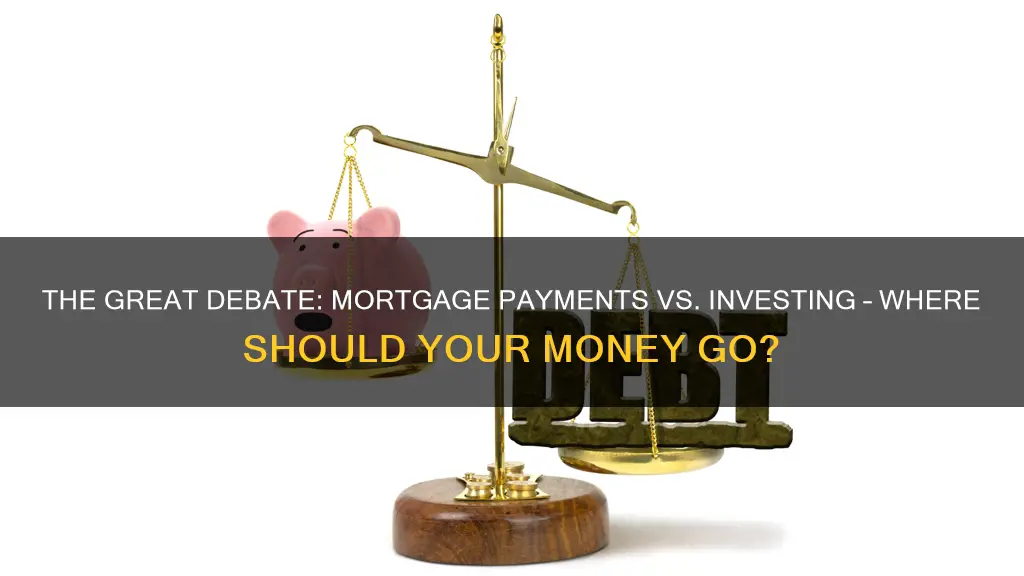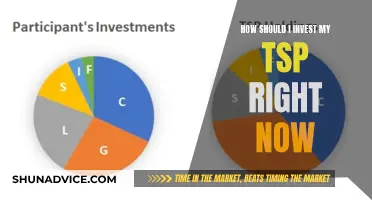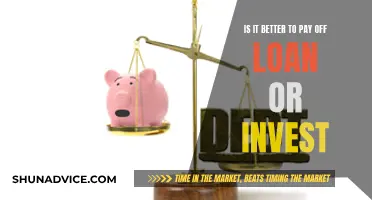
Paying off a mortgage early or investing extra cash is a common dilemma for homeowners, especially as they approach retirement. The answer depends on individual circumstances, but there are several factors to consider when deciding how to allocate your money.
One key consideration is your risk tolerance. Paying off your mortgage is generally considered a safer option as it is predictable and you know exactly how much you are saving. In contrast, investing in the stock market carries more risk due to market volatility, but it also offers the potential for higher returns.
Another factor to think about is the interest rate on your mortgage. If you have a high-interest rate, it is usually a good idea to prioritise paying off your mortgage to reduce the overall cost. On the other hand, if you have a low-interest rate, investing your money elsewhere may be more advantageous.
Additionally, it is important to assess your financial situation and ensure you have sufficient emergency savings and retirement funds before making extra payments on your mortgage.
Finally, consider seeking advice from a financial advisor to help you weigh your options and make an informed decision based on your specific circumstances.
| Characteristics | Values |
|---|---|
| Risk tolerance | High risk tolerance: invest; Low risk tolerance: pay off mortgage |
| Interest rate | High interest rate: pay off mortgage; Low interest rate: invest |
| Retirement | Nearing retirement: pay off mortgage; Early in career: invest |
| Savings | Using savings to pay off mortgage: ensure enough liquid assets are left over; Using savings for investing: ensure enough funds for emergencies |
| Other debt | Pay off other high-interest debt first |
| Emergency fund | Ensure sufficient emergency savings before investing or paying off mortgage |
| Retirement fund | Ensure you are contributing enough to your retirement fund before investing or paying off mortgage |
| Tax | Paying off mortgage may result in loss of tax breaks; Investing in a retirement account may have tax advantages |

Risk tolerance
If you have a low tolerance for risk, you may prefer to pay off your mortgage early. This is generally considered a safer option as it is predictable, and you will know exactly how much you are saving. Paying off your mortgage early can also provide peace of mind and reduce stress, as you will no longer have to worry about monthly payments. Additionally, if you are uncomfortable with the idea of debt, paying off your mortgage can help eliminate that burden.
On the other hand, if you have a higher tolerance for risk, you may be more inclined to invest your money. Investing comes with the potential for higher returns, but it also carries greater risk. The stock market can be volatile, and there is always the possibility of losing money. However, historically, the stock market has offered a higher average rate of return than the average mortgage interest rate. If you are comfortable with taking on more risk and are willing to endure potential losses, investing may be a better option for you.
It's worth noting that your risk tolerance may change over time, especially as you get closer to retirement. As people approach retirement, they tend to become more conservative and focus more on saving rather than investing. Therefore, it's important to periodically reassess your risk tolerance and adjust your financial strategies accordingly.
Ultimately, the decision to pay off your mortgage or invest depends on your individual circumstances and comfort level with risk. Consider seeking advice from a financial advisor, who can help you understand your risk tolerance and make informed decisions about your finances.
AI-Assisted Investing: The Future of Finance
You may want to see also

Emergency savings
When deciding between paying off your mortgage or investing, having sufficient emergency savings is a crucial factor to consider. It is essential to ensure that you have enough liquid assets to cover your needs, including any unexpected expenses. Dipping into your savings to pay off your mortgage early can leave you vulnerable in the event of an emergency, potentially requiring you to take out a new loan or line of credit. Therefore, it is crucial to assess your financial situation and ensure you have enough savings to cover emergencies before making extra payments on your mortgage.
Additionally, when considering paying off your mortgage or investing, it is essential to evaluate your complete financial picture, including any other debts you may have. Credit card debt and personal loans typically carry high-interest rates, so focusing on paying off these debts first should be a priority. By eliminating high-interest debt, you can save money and free up funds that can be directed towards your mortgage or investments.
In conclusion, building an emergency fund and managing other debts should be prioritized when deciding between paying off your mortgage early or investing. Ensure you have sufficient savings to cover unexpected expenses and address any high-interest debt to improve your overall financial situation before making additional payments towards your mortgage or investing.
Forever Stamps: A Smart Investment?
You may want to see also

Retirement savings
- Compound interest: The earlier you start saving for retirement, the more you can benefit from compound interest. This means that your savings will grow faster over time, making it more advantageous to start saving for retirement early on.
- Risk tolerance: Investing in the stock market or other financial instruments typically comes with higher risks than paying off a mortgage. If you are closer to retirement age, you may have a lower risk tolerance and prefer to focus on paying off your mortgage first.
- Interest rates: Compare the interest rate on your mortgage to the potential returns on investments. If your mortgage interest rate is relatively low, you may be better off investing your money instead of paying off the mortgage early.
- Tax considerations: In some cases, mortgage interest may be tax-deductible. Consult a tax advisor to understand the tax implications of paying off your mortgage early versus investing.
- Emergency savings: Ensure you have sufficient emergency savings before deciding to pay off your mortgage or invest. This will help you cover unexpected expenses without having to take on additional debt.
- Retirement planning: Consider your overall retirement planning strategy. If you are not on track to meet your retirement savings goals, investing may be a better option than paying off your mortgage early.
- Financial situation: Evaluate your complete financial picture, including your income, expenses, and other debts. This will help you make an informed decision that aligns with your financial goals and risk tolerance.
Dubai's Investment Trends
You may want to see also

Other debt
When deciding whether to pay off your mortgage or invest, it's important to consider your other debts. Here are some things to keep in mind:
- Credit Card Debt and Personal Loans: Credit cards and personal loans typically carry high interest rates. If you have debt from these sources, it's generally a good idea to prioritise paying them off first. By reducing the interest accrued on these high-interest obligations, you'll save money that can eventually be put towards your mortgage, investments, or both.
- Student Debt: If you're paying off student debt, consider the impact of your monthly payments on your overall financial situation. While student loans often have lower interest rates than credit cards or personal loans, they can still be a significant burden. Evaluate whether paying off your student debt should take priority over investing or paying down your mortgage.
- Other Types of Debt: Evaluate your complete financial picture to determine your debt payoff priorities. Consider the interest rates and repayment terms of any other loans or debts you may have, such as auto loans or medical debt. Focus on debts with high interest rates or those that are causing a strain on your finances.
- Emergency Savings: Before deciding to pay off your mortgage or invest, ensure you have sufficient emergency savings. This will help you cover unexpected costs or income interruptions. The recommended amount is typically between three and six months' worth of living expenses, but the exact amount depends on your risk tolerance, savings capacity, and financial obligations.
- Retirement Savings: Assess whether you are putting away enough for retirement. While there are different expert opinions on the ideal amount to save, consider your retirement goals and the withdrawal strategies you plan to use. Remember that investing in a retirement account can provide tax benefits and employer-matching opportunities.
Remember, the decision to pay off your mortgage or invest depends on your individual financial situation, risk tolerance, and comfort with market fluctuations. Consult a financial planner or advisor to help you analyse your specific circumstances and goals.
Best Etoro Investments Today
You may want to see also

Investment returns
When deciding whether to pay off your mortgage or invest, it's important to consider the potential investment returns. Here are some key points to keep in mind:
- Average Returns: Historically, the stock market has provided average returns of around 7% to 11% annually. The average annual return for stocks is often cited as 8%. However, it's important to remember that market returns can vary significantly from year to year and are not guaranteed.
- Comparing Returns to Mortgage Rates: Compare the expected investment returns to your mortgage interest rate. If the expected returns from investing are higher than your mortgage rate, investing may be more advantageous. For example, if you have a mortgage rate of 4.5% and expect to earn an average of 7% or more from investing, investing could be the better option.
- Time Horizon: Your investment time horizon is crucial. If you have a long-term horizon, such as a young investor with decades until retirement, investing may be more suitable. This allows you to ride out short-term market fluctuations and take advantage of compound returns over time.
- Risk Tolerance: Investing in the stock market carries risk, and you should consider your risk tolerance. If you are comfortable with taking on market risk and potential volatility, investing may be a good option. However, if you prefer a more conservative approach and want predictable returns, paying down your mortgage might be a better choice.
- Opportunity Cost: Consider the opportunity cost of investing versus paying off your mortgage early. By investing, you may be able to generate higher returns, but you also need to be comfortable with the risk of potential losses. Paying off your mortgage early guarantees a return in the form of interest savings.
- Liquidity: Investing in stocks, bonds, and other marketable securities provides liquidity, allowing you to easily access your money if needed. On the other hand, paying off your mortgage early ties up your wealth in an illiquid asset, as converting it back to cash requires selling your home or taking out a second mortgage.
- Tax Considerations: Investing in a retirement account, such as an IRA or 401(k), can provide tax advantages. Additionally, mortgage interest may be tax-deductible if you itemize deductions. Consult a tax advisor to understand the tax implications for your specific situation.
In summary, investing offers the potential for higher returns and liquidity, but it also carries the risk of losses. Paying off your mortgage early provides a guaranteed return through interest savings and reduces debt, but it may not maximize your wealth-building potential. Carefully consider your financial goals, risk tolerance, and time horizon before making a decision.
Dividend ETFs: Smart Investment for Young People?
You may want to see also
Frequently asked questions
Paying off a mortgage early can provide peace of mind and the freedom to pursue other financial goals. It can also help you build equity in your home, which can be useful if you want to refinance or take out a home equity loan. However, it's important to consider the opportunity cost of tying up your wealth in an illiquid asset like property. You may also lose out on tax breaks and investment opportunities with potentially higher returns.
Investing instead of paying off your mortgage early can offer higher returns and more liquidity. If you invest in a retirement account, you may be able to take advantage of employer matching and tax breaks. However, investing carries more risk and volatility than paying off debt, and you will still have to make mortgage payments.
The decision depends on various factors, including your financial situation, risk tolerance, interest rate on your mortgage, age, and investment goals. Generally, if you have a low-interest mortgage, are comfortable with risk, and have a long investment horizon, investing may be a better option. On the other hand, if you have a high-interest mortgage, are risk-averse, or are closer to retirement, paying off your mortgage early may be more advantageous. Consulting a financial advisor can help you make an informed decision based on your specific circumstances.







